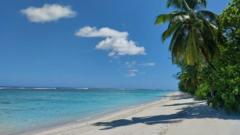Once a peaceful fishing community, Agalega Island is experiencing significant changes after India and Mauritius's military collaboration. Residents express concerns over militarization, loss of land, and the potential eviction amidst ongoing construction of facilities.
Agalega Island: A Fisherman's Home Becomes a Potential Spy Outpost

Agalega Island: A Fisherman's Home Becomes a Potential Spy Outpost
The tiny Mauritian island of Agalega faces transformation into a military hub amid local fears of growing Indian presence.
In the heart of the Indian Ocean, Agalega Island, home to approximately 350 residents, is grappling with significant changes that have both transformed its landscape and stirred anxiety among islanders. Longtime resident Billy Henri Arnaud Poulay recently left Agalega, shedding light on the deep sense of loss over what he perceives as the militarization of his beloved island.
Historically a remote paradise known for its fishing and coconut farming with essential supplies shipped from Mauritius, Agalega has undergone a radical transformation since 2015 when Mauritius signed an agreement with India to enhance maritime security in the region. The deal facilitated the construction of a strategic 3,000-meter runway alongside a new jetty, raising fears that this idyllic locale could evolve into a military outpost.
Poulay, a 44-year-old handyman and reggae musician, led a campaign against the infrastructural developments because of his deep affection for the island. With regard to the base construction, he lamented, “I love my island and my island loves me,” suggesting that the impending changes compelled him to seek a new life elsewhere.
The newly extended runway and facilities could serve to enhance India's surveillance capabilities over marine traffic—a prospect acknowledged by experts. Satellite imagery indicates substantial alterations to the landscape, where lush palm trees have made way for military-grade structures, including potential hangars for Indian navy planes, specifically the P-8I, a sophisticated surveillance aircraft designed for anti-submarine warfare.
Despite rigorous developments, Agalega’s inhabitants harbor fears about their future. Local leaders, including Laval Soopramanien of the Association of Friends of Agalega, assert that parts of the island have been cordoned off, and many worry that their villages may disappear under expanding Indian infrastructure. Notably, some residents express fears of a fate similar to that of families displaced from the nearby Chagos Islands due to British-American military ambitions.
Numerous locals share a common history linked to the Chagos islands, having faced expulsion as their homeland became a military base for the United States. Both Poulay and 26-year-old handyman Billy Henri underscore their alarm at possible evictions, with Henri stating, “My mother lost her island; my father will be the next.” They feel that the Mauritius government is making conditions unbearable to prompt emigration.
In response to growing concerns, the Mauritius government insists that residents will not be forced to leave their homes. Authorities emphasize that islanders are only restricted from accessing the newly built plane and port facilities that are reportedly designed to combat piracy and illegal fishing.
Yet, despite claims of improved infrastructure benefiting islanders, the everyday realities suggest otherwise. Agalegans face limited seasonal ferry services and struggles for effective healthcare. A distressing case has emerged involving a young boy burned from cooking oil who was refused treatment at a newly minted hospital, prompting claims that such facilities are exclusively for Indian personnel.
Prime Minister Pravind Jugnauth vowed to enhance development strategies for Agalega, revealing a “master plan” aimed at improving health, education, and local economy initiatives. However, a cloud of distrust looms as neither Mauritius nor India provide clarity on their 2015 agreement, leaving residents anxious about the future of their home and heritage amidst geopolitical maneuvering.






















